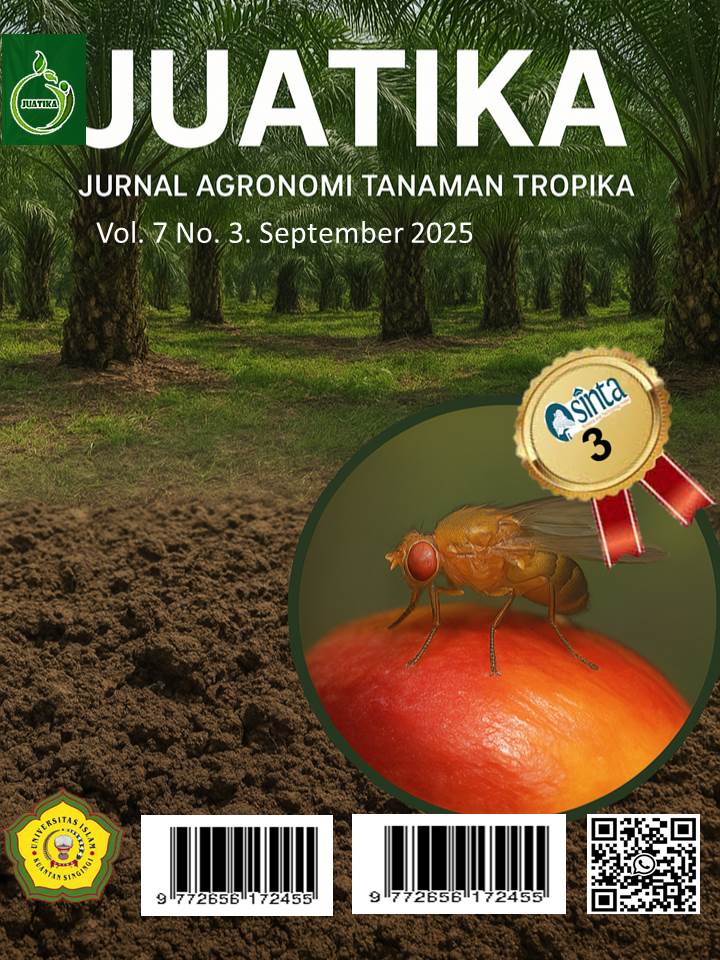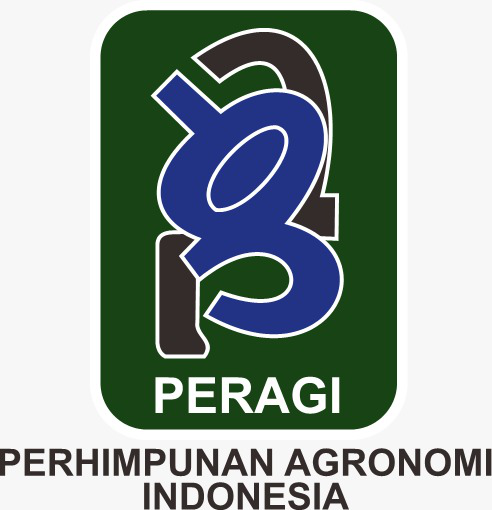Application of Dolomite on The Growth And Yield of Various Rice Genotypes (Oryza sativa L.) Grown on Peat Soil
Abstract
Rice is the primary staple food for the Indonesian population. However, land use changes have increasingly limited the availability of potential land for rice cultivation. Indonesia possesses vast areas of peatland, which offer significant opportunities for rice extensification. Nonetheless, the acidic and nutrient-poor nature of peat soils necessitates soil improvement efforts through the application of soil ameliorants. Dolomite is one such ameliorant that can enhance the chemical properties of soil and improve nutrient uptake by plants. This study aimed to evaluate the interaction between rice genotypes and dolomite application rates on the growth and yield of several rice genotypes cultivated on peatland. The experiment was conducted from June to December 2024 in Sunur Village, Nan Sabaris District, Padang Pariaman Regency, Indonesia, using a Split Plot Design in a randomized complete block layout with three replications. The results showed that the genotype and dolomite application significantly affected several agronomic parameters, particularly the 1000-grain weight. Genotypes Bujang Marantau and Caredek exhibited superior performance in most yield components. Dolomite application at 10 tons/ha proved to be the most effective dose, enhancing plant growth and productivity under peat soil conditions. These findings offer practical recommendations for optimizing rice production on marginal peatlands and promoting sustainable agricultural development in Indonesia.
Downloads
References
Ahmadu, I. S., Rilwanu, Y. A., Babaji, B. A., Kura, H. N., Goma, L., & Yahqub, M. (2021). Yield and yield components of low land rice (Oryza sativa L.) as affected by different cultivation methods in the Sudan savannah. Journal of Agriculture and Environment, 17(2), 79–88.
Alviedo, Usman, Y., & Hakimi, R. (2023). Analisis usahatani padi Bujang Marantau di Nagari Gantung Ciri Kecamatan Kubung Kabupaten Solok. MAHATANI: Jurnal Agribisnis (Agribusiness and Agricultural Economics Journal), 6(1), 13. https://doi.org/10.52434/mja.v6i1.1887
Anwar, C., Nursaputra, M., & Iswanto, I. (2021). Mahasiswa, warga dan hutan seri 1: Data tenurial dan proses fasilitasi kemitraan KHDTK Hutan Pendidikan UNHAS.
Aprianto, P., Salampak, S., & Kresnatita, S. (2021). Pengaruh pemberian amelioran dolomit dengan pupuk kandang ayam terhadap tanaman pakcoy yang tumbuh di lahan gambut. Journal of Environment and Management, 2(2), 131–139. https://doi.org/10.37304/jem.v2i2.2941
Aziz, U. A., Mutakin, J., & Fajarfika, R. (2023). Pengaruh penyiangan dan jarak tanam terhadap pertumbuhan dan hasil padi sawah (Oryza sativa L.) sistem TOT musim ke dua di Kecamatan Wanaraja Kabupaten Garut. Prosiding Seminar Nasional Pertanian 2023, 33, 210–223.
Balai Besar Penelitian Tanaman Padi. (2015). Klasifikasi umur padi.
Bapedalda West Sumatra Province. (2016). Buku data status lingkungan hidup daerah tahun 2014 (p. 553). http://bapedalda.sumbarprov.go.id
Basuki, & Sari, V. K. (2019). Efektifitas dolomit dalam mempertahankan pH tanah Inceptisol perkebunan tebu Blimbing Djatiroto. Buletin Tanaman Tembakau, Serat & Minyak Industri, 11(2), 58–64. https://doi.org/10.21082/btsm.v11n2.2019.58
BB Padi. (2019). Klasifikasi umur padi. http://bbpadi.litbang.pertanian.go.id/index.php/tahukah-anda/120-kalsifikasiumur-padi
BSIP Jambi. (2025). Increasing soil pH using dolomite for optimal rice growth. Balai Standarisasi Instrumen Pertanian Jambi.
Gultom, H., & Mardaleni. (2013). Penggunaan urea tablet dan kapur dolomit terhadap pertumbuhan dan produksi tanaman padi sawah pada tanah gambut. Jurnal Dinamika Pertanian, 28(1), 15–24.
Gunawan, G., Susana, R., & Listiawati, A. (2023). Pengaruh dolomit dan pupuk NPK terhadap pertumbuhan dan hasil tanaman kacang hijau pada lahan gambut. Jurnal Sains Pertanian Equator, 12(2), 178. https://doi.org/10.26418/jspe.v12i2.62021
Jaya, I., Sabahannur, S., & Aminah, A. (2023). Pengaruh pemberian dosis kapur dolomit terhadap pertumbuhan dan perkembangan bibit kakao (Theobroma cacao L.) klon 45. AGrotekMAS Jurnal Indonesia: Jurnal Ilmu Peranian, 3(3), 62–67. https://doi.org/10.33096/agrotekmas.v3i3.267
Katili, H. A., Sayedi, R., Puspapratiwi, D., & Ladonu, I. (2022). Upaya peningkatan produksi jagung berbasis aspek kesuburan tanah di Kecamatan Simpang Raya. Jurnal Ilmiah Mahasiswa Fakultas Pertanian, 2(3), 262–268. https://doi.org/10.52045/jimfp.v3i1.426
Krismawati, A., & Sugiono. (2016). Potensi hasil galur-galur harapan padi hibrida di lahan sawah Kabupaten Malang, Provinsi Jawa Timur. Buletin Plasma Nutfah, 22(1), 21–30.
Kusnadi, H., Desayati, Fauzi, E., Ishak, A., Firizon, J., & Wawan Eka Putra. (2022). Produktivitas padi di lahan rawa dengan kapur dolomit. Jurnal Pertanian, 13(2), 47–53. https://doi.org/10.30997/jp.v13i2.5548
Nurchamidah, L., & Djauhari. (2017). Pengalih fungsian lahan pertanian ke non pertanian di Kabupaten Tegal Laeli. Jurnal AKTA, 4(4), 699–706.
Parmar, D., & Meenakshi. (2025). Transformation of dolomite powder into value added fertilizer and its effect on growth and yield of tomato plant. Comunicata Scientiae, 16(February), 1–10. https://doi.org/10.14295/CS.v16.4261
Prayitno, M. B., & Aji, A. P. (2021). Pengaruh pemberian kapur dolomit dan pupuk urea terhadap emisi gas metana (CH4) pada tanaman padi (Oryza sativa L.) di tanah gambut. Penerbit & Percetakan Universitas Sriwijaya, 682–688.
Ristianingrum, A., Chozin, M. A., Machfud, M., Sugiyanta, S., & Mulatsih, S. (2016). Optimalisasi keberlanjutan pengembangan usaha padi organik di Kabupaten Cianjur, Jawa Barat. Jurnal Manajemen dan Agribisnis, 13(1), 37–49. https://doi.org/10.17358/jma.13.1.37
Safriyani, E., Hasmeda, M., Munandar, M., & Sulaiman, F. (2019). Korelasi komponen pertumbuhan dan hasil pada pertanian terpadu padi-Azolla. Jurnal Lahan Suboptimal, 7(1), 59–65. https://doi.org/10.33230/jlso.7.1.2018.344
Salawati, Ende, S., & Lukman. (2019). Optimasi lahan pada sistem tumpang sari jagung manis. Jurnal Agroqua, 17(2), 115–125. https://doi.org/10.32663/ja.v
Sari, N., & Nila, I. R. (2019). Dekomposisi mineral dolomit melalui proses kalsinasi. Hadron, 1(02), 22–24.
Siruru, H., Syafii, W., Wistara, N. J., & Pari, G. (2018). The effect of steam duration on quality and characteristics of activated charcoal of sago waste. Jurnal Ilmu dan Teknologi Kayu Tropis, 16(2), 115–130.
Sunarsih, S., Sari, I., & Riono, Y. (2018). Pengaruh dosis pengapuran terhadap peningkatan pH tanah dan produksi tomat (Lycopersicum esculentum Mill.) pada media gambut. Jurnal Agro Indragiri, 1(01), 266–276. https://doi.org/10.32520/jai.v1i01.676
Suyitno. (2019). Padi sawah (Oryza sativa) varietas Bujang Marantau adaptif di wilayah Junjung. http://cybex.pertanian.go.id/mobile/artikel/78623/PadiSawahoryzaSativa-Varietas-Bujang-Marantau-Adaptif--Di-Wilayah-Junjung-Sirih/
Swasti, E., Syarif, A., Suliansyah, I., & Erawati, N. (2007). Eksplorasi, identifikasi dan pemanfaatan koleksi plasma nutfah padi asal Sumatera Barat. Laporan Penelitian Program Intensif Riset Dasar Tahun 2007.
Warta BSIP Pasca Panen. (2023). Sertifikasi mutu beras sebagai pencegah manipulasi mutu. Warta BSIP Pasca Panen, 2.
Widjajanto, D. W., Dwi Purbajanti, E., Adi Kristanto, B., & Agron Agri R, I. J. (2023). The effect of dolomite and silicon application on rice (Oryza sativa cv. Situ Bagendit) cultivation on its performance. International Journal of Agronomy and Agricultural Research (IJAAR), 22(2), 21–26. http://www.innspub.net
Wulandari, L., Sarifuddin, & Hidayat, B. (2014). Effect of sea water and mineral materials on soil chemical, growth and production of rice in peat. Jurnal Online Agroekoteknologi, 2(4), 1376–1383.
Yunidawati, W., & Koryati, T. (2022). Pengaruh umur dan jumlah bibit per lubang tanam terhadap pertumbuhan dan produksi padi sawah (Oryza sativa L.). Jurnal Institusi Politeknik Ganesha Medan, 5(1), 116–131. https://doi.org/10.33395/juripol.v5i1.11315
Copyright (c) 2025 Rona Tri Madani, Irfan Suliansyah, Benni Satria, Atman

This work is licensed under a Creative Commons Attribution 4.0 International License.
Authors who publish with Jurnal Agronomi Tanaman Tropika (JUATIKA) agree to the following terms:
Authors retain copyright and grant the Jurnal Agronomi Tanaman Tropika (JUATIKA) right of first publication with the work simultaneously licensed under a Creative Commons Attribution License (CC BY 4.0) that allows others to share (copy and redistribute the material in any medium or format) and adapt (remix, transform, and build upon the material for any purpose, even commercially) with an acknowledgment of the work's authorship and initial publication in Jurnal Agronomi Tanaman Tropika (JUATIKA).
Authors are able to enter into separate, additional contractual arrangements for the non-exclusive distribution of the journal's published version of the work (e.g., post it to an institutional repository or publish it in a book), with an acknowledgment of its initial publication in Jurnal Agronomi Tanaman Tropika (JUATIKA). Authors are permitted and encouraged to post their work online (e.g., in institutional repositories or on their website) prior to and during the submission process, as it can lead to productive exchanges, as well as earlier and greater citation of published work.







 More Information
More Information


